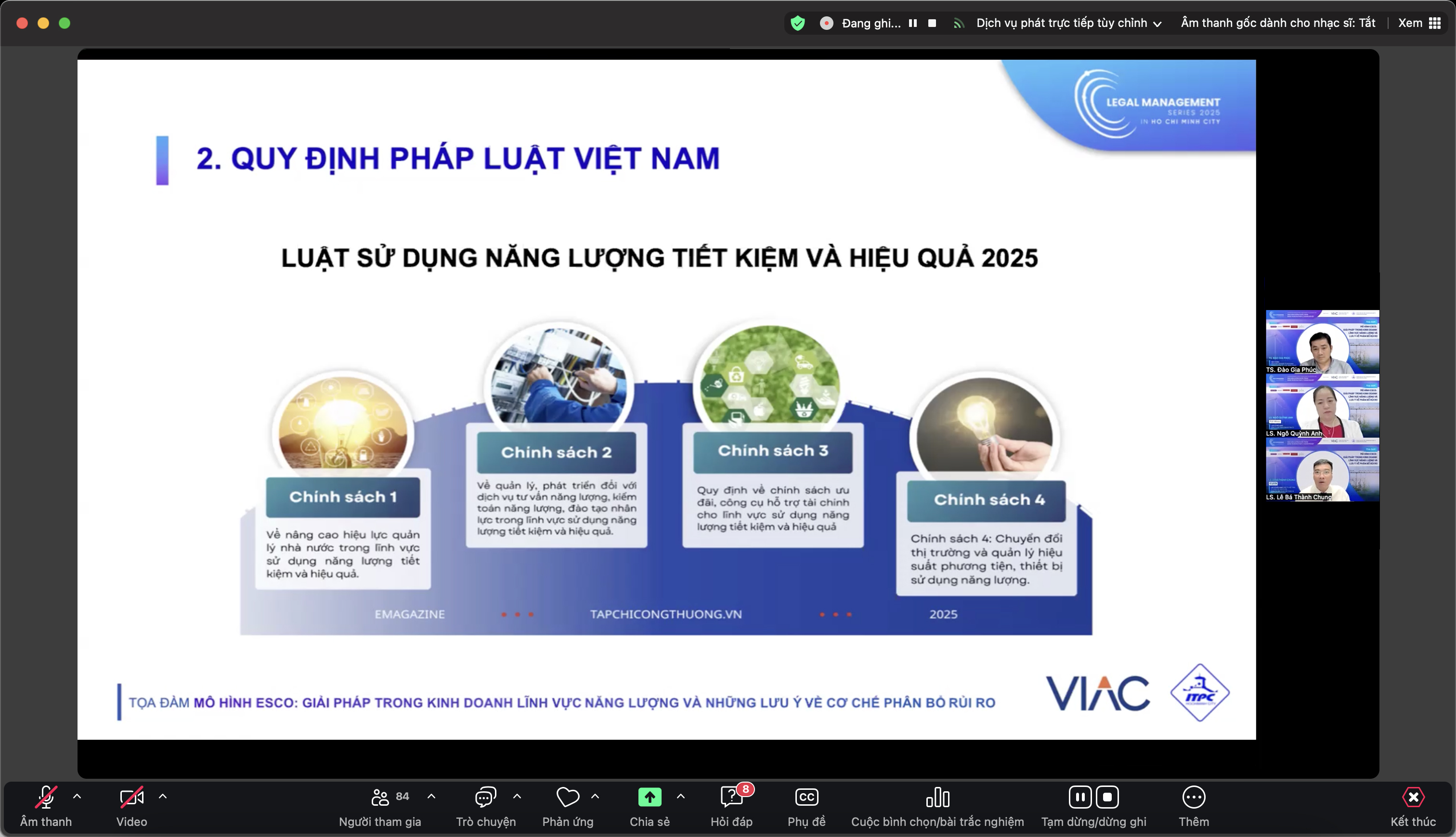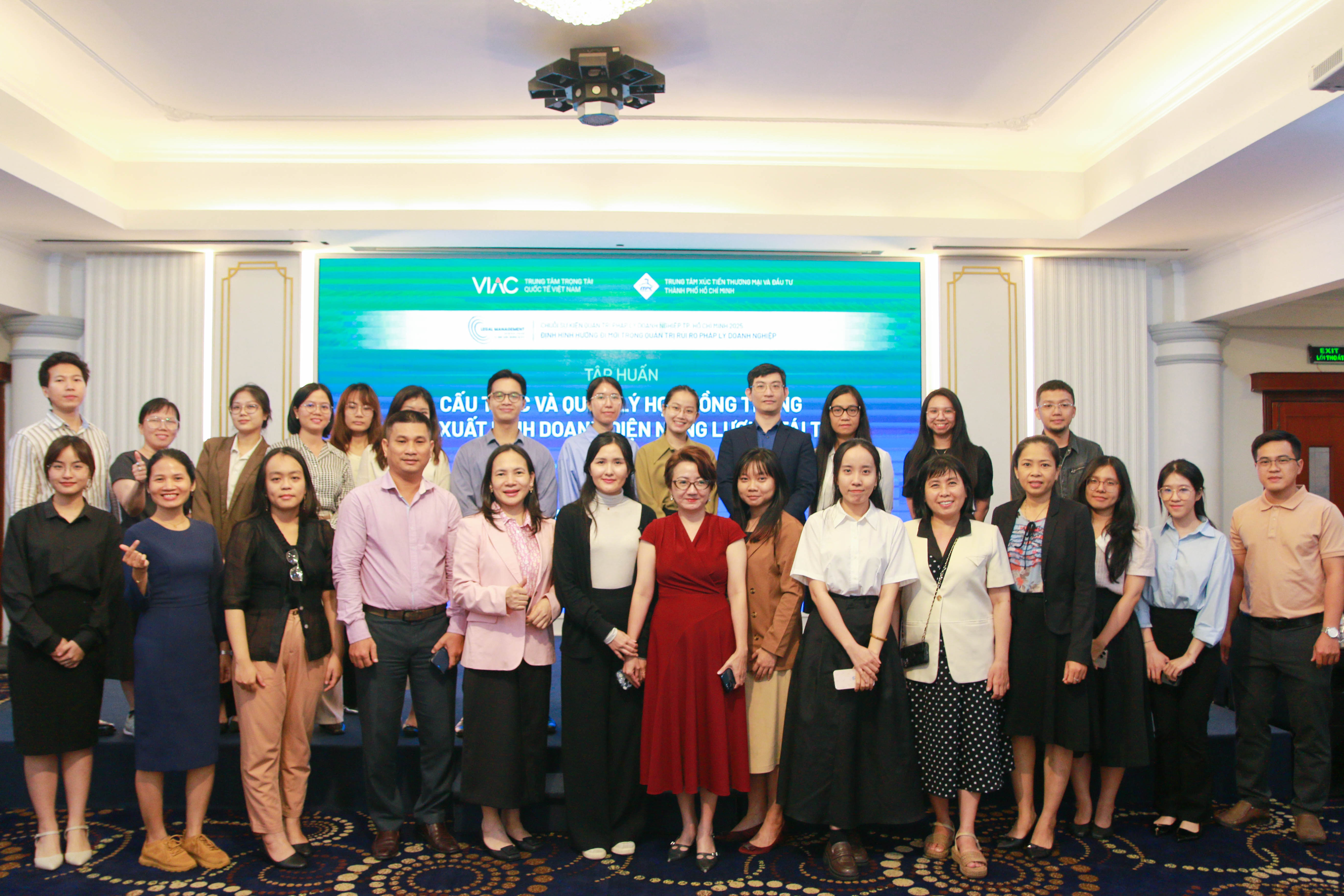As part of the Legal Management Series 2025 (LMS 2025), the seminar titled “ESCO Model: A business solution in energy sector and key considerations on risk allocation mechanisms” was jointly organized by the Vietnam International Arbitration Centre (VIAC) and the Ho Chi Minh City Investment and Trade Promotion Centre (ITPC). The event attracted more than 100 enterprises attending online.
Participating in the event were a panel of experts: Mr. Lê Bá Thành Chung - Managing Partner at CLVN Law Firm, Arbitrator at the Vietnam International Arbitration Centre (VIAC); Dr. Đào Gia Phúc - Director of the Institute of International & Comparative Law - University of Economics and Law, Vietnam National University, Ho Chi Minh City; and Ms. Ngô Quỳnh Anh - Managing Partner at EPLegal. Through an interactive format of questions and exchanges, the experts jointly discussed the effectiveness of the Energy Service Company (ESCO) model, the types of contracts, and practical issues arising in the course of implementing the ESCO model both in Vietnam and globally.

ESCO is a business model designed to provide enterprises with comprehensive solutions for improving energy efficiency in total, through the provision of services including energy auditing, planning, construction, installation, operation, maintenance, leasing of energy infrastructure, and other forms. Ms. Ngô Quỳnh Anh observed that in practice this model is typically implemented through three principal types of contracts: (i) Energy Savings Performance Contract (ESPC); (ii) Power Purchase Agreement (PPA); and (iii) energy savings guarantee agreements. Regarding the legal basis, Ms. Quỳnh Anh updated that the Law on Economical and Efficient Use of Energy 2025 has introduced an official definition of energy service companies as well as energy performance contracts, while also providing more specific regulations on ESCO operations. The Law further expands mechanisms for project support and financing, and encourages activities that promote economical and efficient energy use with greater flexibility than before, thereby establishing an important legal foundation for the development of this model in Vietnam.
In comparison internationally, Dr. Đào Gia Phúc noted that the ESCO model has long been established in the United States and Europe, where it is regarded as an effective mechanism to enhance energy efficiency and reduce business costs. The success of ESCOs in those markets is also attributable to a more open and enabling legal framework. By contrast, in Viet Nam, the ESCO market remains relatively nascent and has yet to reach its full potential. One of the greatest obstacles lies in the absence of a comprehensive and specific legal framework governing ESCO operations. This gap has resulted in a lack of confidence among investors and enterprises, thereby hindering the model’s scalability. Enterprises may face numerous challenges, including the absence of measurement and verification protocol, which complicates profit calculation; constraints in financial mechanisms, particularly the lack of regulations on guarantees, risk-sharing, and payment mechanisms in EPC contracts; difficulties in accessing credit capital; and persistent gaps in dispute resolution mechanisms.
Following the plenary session, under the moderation of Mr. Lê Bá Thành Chung, the seminar proceeded with a Q&A and discussion between the experts and participants. Through these exchanges and clarifications, the experts conveyed key messages and recommendations for enterprises to consider in applying the ESCO model within the current legal framework as well as in the forthcoming period.
▶️ Watch the Talkshow at: https://www.youtube.com/watch?v=i5tEoivCW_I
-------------------------------
INFORMATION ON EVENTS IN THE ENERGY SECTOR | LMS 2025
.jpg) | Conference "Cooperation in investing & operating energy projects: Developments, current trends & solutions for enterprises" |
 | Training workshop "Contract structuring and management in renewable power production and business" |